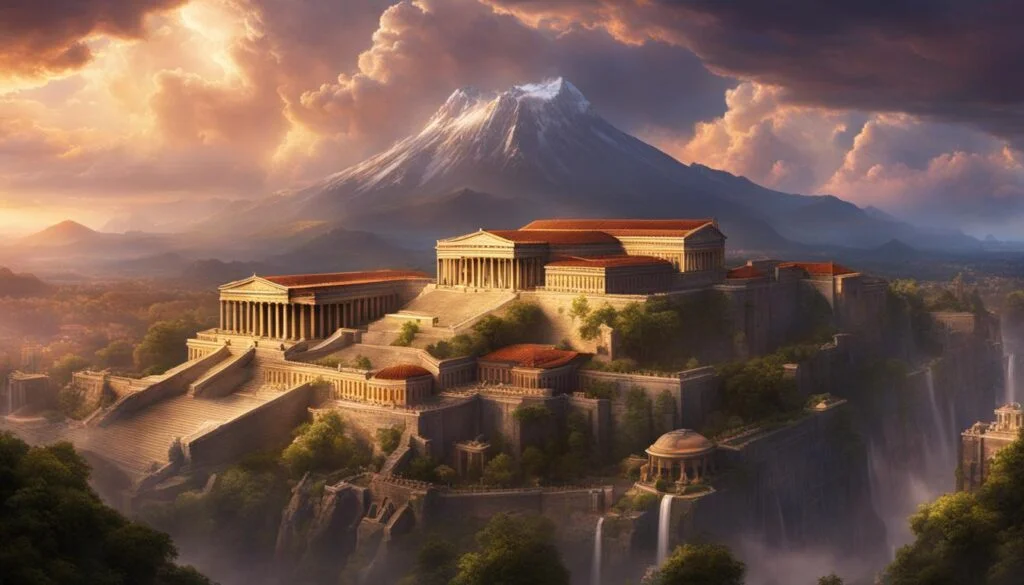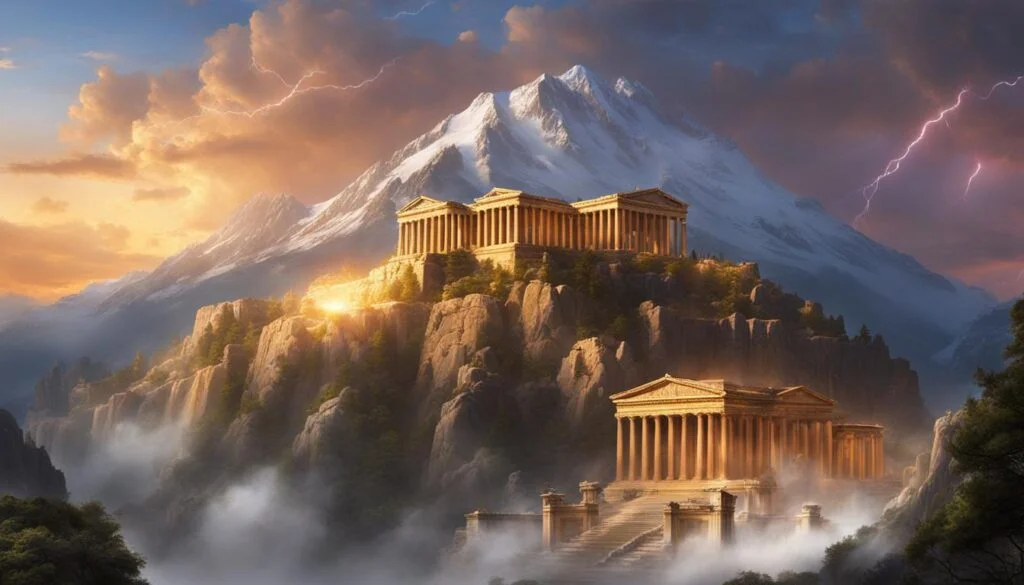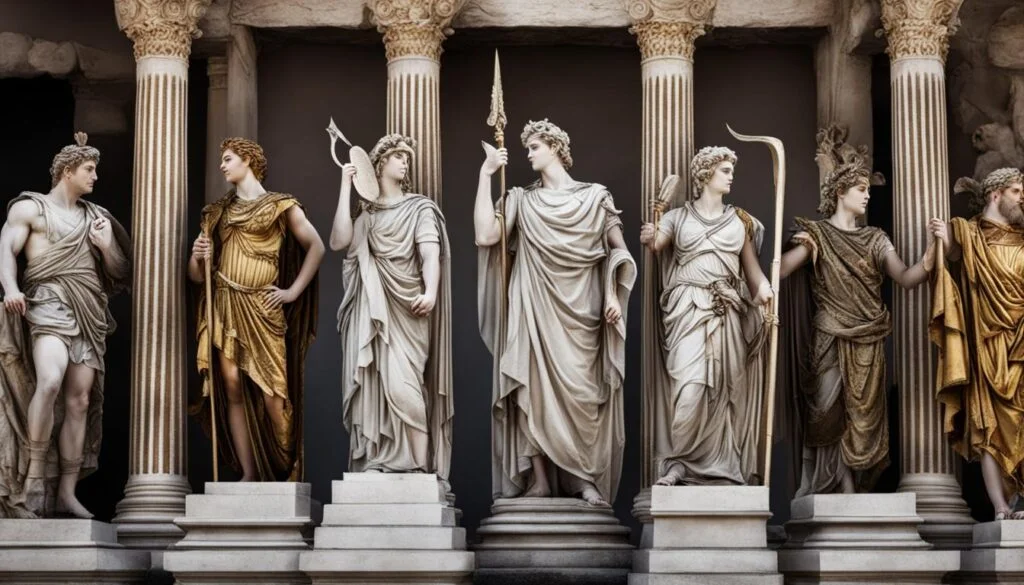Mount Olympus holds great significance in Roman mythology as the dwelling place of the gods.
Both Greek and Roman mythology depict Mount Olympus as the home of the Roman gods and the center of ancient Roman religion.
The gods and goddesses resided in their separate dwellings but would gather in the palace of Jupiter on Mount Olympus to discuss the affairs of heaven and earth.
Key Takeaways:
- Mount Olympus is regarded as the dwelling place of the Roman gods.
- It is the center of ancient Roman religion.
- The gods and goddesses would gather in the palace of Jupiter on Mount Olympus to discuss important matters.
- The mountain holds great significance in both Greek and Roman mythology.
- Mount Olympus symbolizes the connection between the divine and mortal realms.
The Mythology of Mount Olympus
In Roman mythology, Mount Olympus holds great significance as the celestial abode of the gods and goddesses.
This mythical mountain served as the gathering place for divine beings, who would convene in the grand palace of Jupiter atop Mount Olympus.
It was on this majestic peak that the gods indulged in the heavenly delicacies of ambrosia and nectar while deliberating matters of the realms of heaven and earth.
The pantheon of principal Roman deities, including Jupiter, Juno, Mars, Minerva, Neptune, Vesta, Apollo, Venus, Ceres, and Diana, resided on the sacred slopes of Mount Olympus.
These gods and goddesses embodied various aspects of Roman culture and mythology, with Jupiter being the king of the gods and Juno as his consort.
These divine beings, with their godly powers and distinct personalities, played an essential role in Roman religious practices and were revered by the Roman people.
Mount Olympus, as the dwelling place of these revered gods, developed a deep cultural significance in Roman society.
Furthermore, the gods and goddesses of Mount Olympus influenced various aspects of daily life in ancient Rome.
They were believed to have control over different domains, such as war, wisdom, love, agriculture, and hunting.
The Romans sought their favor by offering prayers, and sacrifices, and participating in religious ceremonies.
The presence of the gods on Mount Olympus reinforced the belief in the supreme power and influence of these deities, shaping the religious and cultural fabric of Roman society.
The Role of Mount Olympus in Roman Cosmogony

Mount Olympus played a vital role in Roman cosmogony, serving as a significant element in the origin stories and relationships of the Roman gods and goddesses.
It was believed that the Roman deities, descendants of the primordial gods, originated from and resided on Mount Olympus, making it the heart of Roman culture.
The Roman pantheon, consisting of the principal deities such as Jupiter, Juno, Mars, Minerva, Neptune, Vesta, Apollo, Venus, Ceres, and Diana, was deeply connected to Mount Olympus.
The mountain served as the focal point where these gods and goddesses were believed to have emerged, and their divine powers were intertwined.
As the center of Roman cosmogony, Mount Olympus held immense significance in the understanding of Roman mythology and culture.
It allowed the Romans to comprehend the origin and existence of their gods and provided a sense of unity and purpose within the pantheon.
Origin Stories and Divine Connections
- Mount Olympus was believed to be the birthplace of Jupiter, the king of gods, and the ruler of the Roman pantheon.
. - Juno, the queen of gods and Jupiter’s wife, also had her divine dwelling on Mount Olympus.
. - The mythology surrounding Mars, the god of war, and Minerva, the goddess of wisdom, showcased their close association with Mount Olympus.
. - Neptune, the god of the sea, was believed to control the waters surrounding Mount Olympus.
. - Vesta, the goddess of the hearth, resided in her sacred temple on the mountain.
. - Apollo, the god of music, poetry, and prophecy, was connected to Mount Olympus through his oracle at Delphi, located in the mountain’s vicinity.
. - Venus, the goddess of love and beauty, represented the divine feminine and had her influences felt on Mount Olympus.
. - Ceres, the goddess of agriculture and fertility, played a crucial role in the sustenance of life on the mountain.
. - Diana, the goddess of the hunt and the moon, embodied the wild nature of Mount Olympus and its surroundings.
The stories of these gods and goddesses, their interactions, and their dominion over various aspects of life were intricately connected to the mythology and symbolism of Mount Olympus.
The Mythology and Symbolism of Mount Olympus

Mount Olympus holds great symbolism in Roman mythology and religion. It is revered as the meeting place of heaven and earth, representing the profound connection between the divine and mortal realms.
The perpetually enveloping clouds surrounding Mount Olympus serve as a constant reminder of this mystical connection.
Moreover, Mount Olympus is not only a physical location but also a sacred space for worship and spiritual contemplation.
In the foothills and lower levels of the mountain, sacred groves and sacrificial sites were established, providing devotees with a tangible connection to their deities.
The spiritual significance of Mount Olympus in Roman culture cannot be overstated.
It was a place where individuals could seek divine guidance, offer prayers, and experience a profound sense of awe and connection with the gods.
The rituals and practices performed on Mount Olympus were a vital part of Roman religious life and played a crucial role in the daily lives of the Roman people.
Mount Olympus served as a pilgrimage site for devoted followers and was considered a sacred space that bridged the gap between the mortal and divine worlds.
Its importance extended beyond just mythology and religion, shaping the cultural fabric of Roman society.
The Physical Attributes and Geographic Location of Mount Olympus

In the realm of Roman mythology, Mount Olympus holds a significant place as the dwelling place of the gods.
But beyond the realm of legend, Mount Olympus is a physical mountain located in Greece. Standing tall as the highest peak in Greece, it reaches a magnificent height of 9,570 feet.
With its soaring heights and majestic presence, Mount Olympus stands as a natural wonder and a testament to the power and grandeur of nature.
The physical features of Mount Olympus are awe-inspiring. Its peaks are perpetually covered in snow, creating a breathtaking spectacle of serene beauty.
Shrouded in clouds, Mount Olympus offers an ethereal view, as if it is touching the very heavens it is associated with.
In Greek mythology, the peak was described as basking in pure upper air or ether, further enhancing its mystique and sense of otherworldly magnificence.
Geographically, Mount Olympus is situated near the Gulf of Thérmai, on the border between the regions of Macedonia and Thessaly.
Its strategic location in Greece adds to its historical and cultural significance, as Greece itself is renowned for its rich mythology and ancient civilization.
Take a moment to admire the breathtaking beauty of Mount Olympus:
The Cultural Significance of Mount Olympus

Mount Olympus holds tremendous cultural significance in Roman mythology and culture.
As the dwelling place of the gods, it was revered as a symbol of power and divinity, capturing the imagination of ancient Greeks and Romans.
The mountain served as a central location for various religious and cultural practices.
Festivals and rituals dedicated to Zeus and other deities were held on Mount Olympus, drawing communities together to celebrate and honor their gods.
These events fostered a sense of unity and reinforced the importance of faith in Roman society.
Additionally, Mount Olympus played a role in the backdrop of ancient Greek and Roman society.
Its majestic presence inspired awe and respect, serving as a constant reminder of forces greater than human beings.
The mountain’s towering peaks and enigmatic clouds reinforced the belief in the divine nature of the gods and their influence over mortal affairs.
The cultural significance of Mount Olympus extended beyond religious and societal realms.
It permeated art, literature, and philosophy, serving as a muse for countless poets, writers, and thinkers.
Mount Olympus became a symbol of aspiration, representing the pursuit of excellence and the quest for divine wisdom.
Even in contemporary times, the cultural relevance of Mount Olympus endures.
Its symbolism continues to inspire creativity and spiritual contemplation. People from all walks of life are drawn to the mountain, seeking a connection to ancient mythology and the profound sense of wonder associated with the gods.
In summary, Mount Olympus holds a profound cultural significance in Roman mythology and culture.
It served as a central location for religious and cultural practices, inspired awe and reverence, and continues to inspire artistic pursuits and spiritual experiences.
Mount Olympus stands as a testament to the enduring power and influence of ancient Roman mythology.
Conservation and Preservation Efforts for Mount Olympus

Mount Olympus, with its rich biodiversity, is recognized as a National Park and Biosphere Reserve in Greece.
As a result, conservation efforts have become a top priority to protect its natural resources.
However, the mountain faces challenges such as tourism development and illegal logging that pose a threat to its delicate ecosystem.
The Greek government is actively involved in safeguarding the flora and fauna of Mount Olympus.
Conservation guidelines are being strictly enforced to prevent any further degradation of the mountain.
Additionally, there are ongoing discussions to designate Mount Olympus as a World Heritage site, further highlighting its importance and ensuring its long-term preservation.
Efforts to conserve and protect Mount Olympus not only ensure the survival of its unique species but also contribute to the preservation of the mountain’s cultural and historical significance.
By safeguarding this sacred place, we can maintain the connection to the Roman pantheon and the religious traditions associated with Mount Olympus, keeping alive the ancient practices and beliefs.
Spiritual Revival and Contemporary Relevance of Mount Olympus

While Mount Olympus has evolved in its significance, it still holds cultural and spiritual importance.
Despite the majority of Greeks practicing Christianity, there has been a revival of interest in pre-Christian Greek philosophy and neo-paganism.
Mount Olympus in Roman culture serves as a powerful symbol of ancient beliefs and heritage.
Some individuals embark on spiritual journeys, visiting Mount Olympus to reconnect with the ancient gods of Greek mythology and experience a spiritual connection to their ancestral roots.
Mount Olympus offers a unique opportunity for those seeking spiritual experiences.
The serene surroundings and majestic peaks create an ideal setting for introspection and contemplation.
Visitors can immerse themselves in the serene beauty of nature, paying homage to the gods and seeking solace.
The revival of interest in Mount Olympus speaks to its enduring significance in Roman mythology.
It symbolizes a deeper yearning to connect with the past and explore the mysteries of the divine.
As individuals seek meaning and transcendence, Mount Olympus remains a place where ancient traditions come to life.
Rediscovering Ancient Wisdom and Beliefs
- Neo-pagan rituals and celebrations on Mount Olympus allow participants to reconnect with the gods and goddesses of Roman mythology.
- Visitors engage in prayer, meditation, and offerings to honor the ancient deities and seek their guidance.
- Events and gatherings on Mount Olympus foster a sense of community, allowing like-minded individuals to connect and share their spiritual experiences.
A Destination of Inspiration and Enlightenment
- The natural beauty of Mount Olympus serves as a source of inspiration for artists, writers, and philosophers who seek to capture the essence of the gods’ abode.
- Explorers and adventurers find solace and a renewed sense of purpose in the challenging expeditions to the mountain’s peaks.
- The spiritual energy and historical significance of Mount Olympus attract curious minds, scholars, and spiritual seekers from around the world.
In the contemporary world, Mount Olympus continues to captivate hearts and minds, bridging the gap between the ancient and the modern.
It stands as a testament to the enduring power of mythology, reminding us of the richness of human imagination and our eternal quest for meaning.
Conclusion
In conclusion, Mount Olympus plays a vital role in Roman mythology and religion.
Believed to be the dwelling place of the Roman gods, it holds great significance as the site of their palace.
Mount Olympus serves as a symbol of the connection between the divine and mortal realms, making it a focal point for worship and spiritual contemplation.
The mountain’s physical attributes, such as its towering peak and ethereal clouds, along with its geographic location, contribute to its enduring relevance in Roman mythology and culture.
Mount Olympus occupies a significant place in Roman religion, representing the belief system and the divine pantheon that governed ancient Roman society.
The gods and goddesses of Mount Olympus were revered and worshipped by the Romans, shaping their cultural practices, festivals, and rituals.
The mountain’s association with the principal Roman deities, such as Jupiter, Juno, Mars, and Minerva, further emphasizes its importance in Roman religion.
Efforts are being made to protect and preserve Mount Olympus, not only for its ecological value but also for its cultural heritage.
Recognized as a National Park and Biosphere Reserve in Greece, Mount Olympus faces challenges such as tourism development and illegal logging.
Nevertheless, the Greek government is actively implementing conservation guidelines and considering its designation as a World Heritage site, ensuring that Mount Olympus will continue to inspire awe and reverence for generations to come.
FAQ
What is the significance of Mount Olympus in Roman mythology?
Mount Olympus holds great significance in Roman mythology as the dwelling place of the gods. It is considered the home of the Roman gods and the center of ancient Roman religion.
Who resided on Mount Olympus in Roman mythology?
The principal Roman deities, including Jupiter, Juno, Mars, Minerva, Neptune, Vesta, Apollo, Venus, Ceres, and Diana, resided on Mount Olympus in their separate dwellings.
How does Mount Olympus play a role in Roman cosmogony?
Mount Olympus served as the focal point of the origin stories of the Roman gods and goddesses. It was believed to be the place where they originated and their relationships to each other were explained.
What symbolism does Mount Olympus hold in Roman mythology and religion?
Mount Olympus symbolizes the connection between the divine and mortal realms, serving as the meeting place of heaven and earth. It is also a site of worship and spiritual contemplation.
Where is Mount Olympus located and what are its physical attributes?
Mount Olympus is a physical mountain located in Greece, characterized by its snow-capped peaks and often covered in clouds. It is the highest peak in Greece, reaching a height of 9,570 feet.
What is the cultural significance of Mount Olympus in Roman mythology?
Mount Olympus was not only seen as the dwelling place of the gods but also revered as a symbol of power and divinity. It was a central location for religious and cultural practices, including festivals and rituals dedicated to Zeus and other deities.
What conservation and preservation efforts are being made for Mount Olympus?
Mount Olympus is recognized as a National Park and Biosphere Reserve in Greece, and the Greek government is actively working to protect its flora and fauna by enforcing conservation guidelines and considering its designation as a World Heritage site.
What is the contemporary relevance of Mount Olympus?
Despite the majority of Greeks practicing Christianity, there has been a revival of interest in pre-Christian Greek philosophy and neo-paganism. Some individuals participate in prayer and rituals on Mount Olympus to reconnect with ancient Greek religion and their heritage.
Why is Mount Olympus significant in Roman mythology?
Mount Olympus holds a vital place in Roman mythology and religion as the dwelling place of the Roman gods and the site of their palace. It symbolizes the connection between the divine and mortal realms and serves as a focal point for worship and spiritual contemplation.




